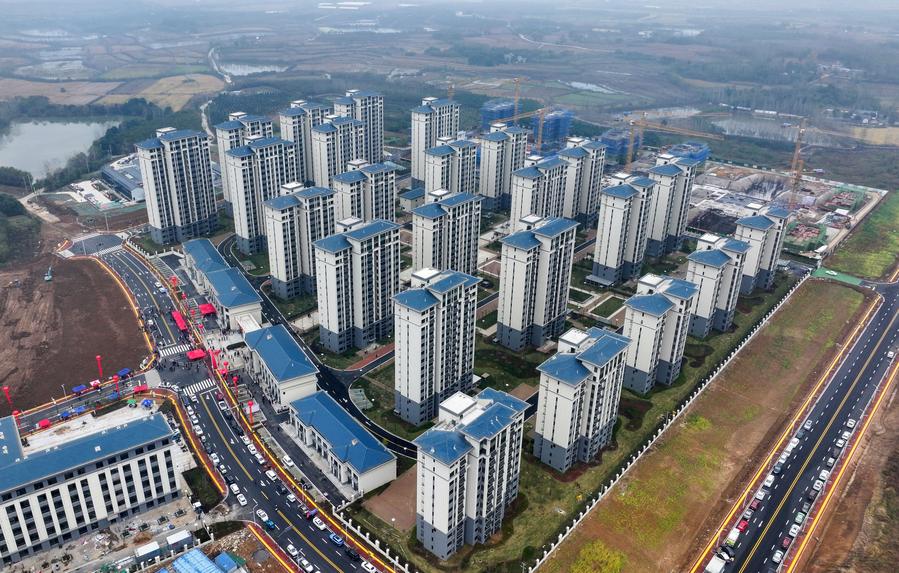
Fueled by favorable policies, China's residential real estate market witnessed an uptick in inquiries and viewings over the first three days of the National Day holiday. Experts have predicted a country-wide market revival marked by increased transactions, with first-tier cities leading the trend.
They said recent policy adjustments that eased restrictions on leveraging, along with previous measures such as ensuring the delivery of pre-sale properties and the 300 billion yuan ($42.7 billion) loan to State-owned enterprises for affordable housing projects, are crucial for stabilizing the market. However, further support from the central bank may still be required to sustain the momentum.
READ MORE: Major Chinese cities ease home-buying rules to stabilize property market
"Our phones rang non-stop the day new policies were announced, as they captured the attention of numerous potential homebuyers," said Wu Libin, sales manager at house-letting agency 5i5j in Beijing, adding that inquiries are still coming in.
Another sales manager in Beijing E-Town told Beijing News on Tuesday that transactions worth 125 million yuan had been completed and more than 100 families had visited the development area since Beijing announced its policies on Monday.
There was a rush of inquiries elsewhere too. In Guangzhou, Guangdong province, a housing sales center in Liwan district extended its office hours and stayed open throughout the night following Guangzhou's policy announcement on Sunday.
By Monday noon, the number of visitors to the sales center had surged by 200 percent compared to usual levels, according to Jimu News. A staff member surnamed Liu said while some buyers jumped at the chance to buy following the policy announcement, others had opted for a wait-and-watch approach.
Shenzhen in Guangdong province and Shanghai also reported a rise in the number of visitors to various sales offices. Latest data from a research center of realty agency Leyoujia revealed a nearly 40 percent surge in pre-owned home transactions at Leyoujia sales centers on Monday compared to the previous day — the highest since February 2021. New home transactions also hit a two-year high. Xinmin Evening News revealed that multiple sales offices in Shanghai are fully booked for house viewings next week.
The Ministry of Housing and Urban-Rural Development said on Sunday that cities, especially first-tier cities, should utilize policies and adjust housing purchase restrictions based on local conditions.
The same day, Shanghai, Guangzhou and Shenzhen all made significant policy changes. Shanghai streamlined its purchase restrictions, notably reducing the threshold and initial payment costs. Among first-tier cities, Guangzhou was the first to completely remove home purchase restrictions. Shenzhen also lifted such restrictions in several areas.
On Monday, Beijing also announced measures such as further reducing interest rates on existing housing loans and lowering the minimum down payment for personal housing loans.
Yan Yuejin, vice-president of the Shanghai-based E-House China R&D Institute, said the new policies in the four major cities, in conjunction with financial policies from the People's Bank of China, are timely, precise and comprehensive, playing a positive role in stabilizing the real estate market.
ALSO READ: China's major national commercial banks plan mortgage rate adjustment
"All of the four first-tier cities have modified their purchase restrictions in response to new market demands, continuously optimizing relevant policies to better support the release of reasonable housing consumption demands. Other cities nationwide are expected to follow suit, indicating a period of comprehensive policy relaxation," Yan said.
"China's real estate market is anticipated to witness a wave of transactions in the fourth quarter, potentially seeing a favorable trend of both increased sales volume and prices."
Charlie Zheng, chief economist at Samoyed Cloud Technology Group Holdings, took a more cautious stance. He said that while the property market had previously experienced an overall decline in sales, the introduction of positive policies could halt this trend in cities particularly with strong demand and population influxes. However, a combined effort of existing policies and potentially further increased loan support from the central bank could be necessary for a nationwide rebound in the realty market in the future.


